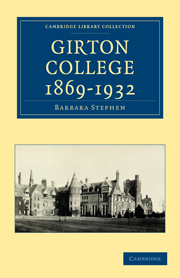Book contents
- Frontmatter
- Contents
- Preface
- Chapter I INTRODUCTION
- Chapter II PRELIMINARY WORK FOR THE COLLEGE
- Chapter III THE COLLEGE IN ITS PIONEER DAYS
- Chapter IV FROM HITCHIN TO GIRTON
- Chapter V GROWTH AND CONSOLIDATION 1875–1903
- Chapter VI A TIME OF TRANSITION 1903–1922
- Chapter VII THE ROYAL COMMISSION AND THE CHARTER
- Chapter VIII THE STATUTES OF 1926, AND THE NEW BUILDINGS
- Chapter IX VARIOUS MATTERS
- Biographical Index
- Index
- Plate section
Chapter VIII - THE STATUTES OF 1926, AND THE NEW BUILDINGS
Published online by Cambridge University Press: 05 July 2011
- Frontmatter
- Contents
- Preface
- Chapter I INTRODUCTION
- Chapter II PRELIMINARY WORK FOR THE COLLEGE
- Chapter III THE COLLEGE IN ITS PIONEER DAYS
- Chapter IV FROM HITCHIN TO GIRTON
- Chapter V GROWTH AND CONSOLIDATION 1875–1903
- Chapter VI A TIME OF TRANSITION 1903–1922
- Chapter VII THE ROYAL COMMISSION AND THE CHARTER
- Chapter VIII THE STATUTES OF 1926, AND THE NEW BUILDINGS
- Chapter IX VARIOUS MATTERS
- Biographical Index
- Index
- Plate section
Summary
Miss Major's Mistress-ship (1925–31). The Statutes of 1926. The new Library and other buildings. The Appointments Board.
“The summer of 1925 finds all Girtonians at I the mercy of very mixed feelings—the sorrow of parting with Miss Phillpotts and the joy of welcoming Miss Major…. Miss Major is an old and much loved friend of the College. We congratulate ourselves that after a long and distinguished career at Blackheath, Putney, and Birmingham, she is willing to return to her own College as Mistress, and we welcome her with every possible good wish.” In such wise was Miss Phillpotts's successor greeted at Girton. An old student of the College, she had had a distinguished career as a teacher, and had since 1911 been Headmistress of King Edward VI School, Birmingham. She entered upon her duties as Mistress of Girton at the moment when the great changes brought about by the Charter were coming into effect, creating new relations between the Mistress and the Council, and a new position for the resident staff of the College. Only a year later, in 1926, relations with the University were also profoundly changed by the Statutes consequent upon the Royal Commission. To Miss Major fell the task of guidance during these critical years of initiation, a task which she was particularly well able to fulfil. Her sound and ready judgment, her wide sympathies, her wit and knowledge of the world, were of the utmost value both within the College and in relation to the University.
- Type
- Chapter
- Information
- Girton College 1869–1932 , pp. 129 - 143Publisher: Cambridge University PressPrint publication year: 2010First published in: 1933



